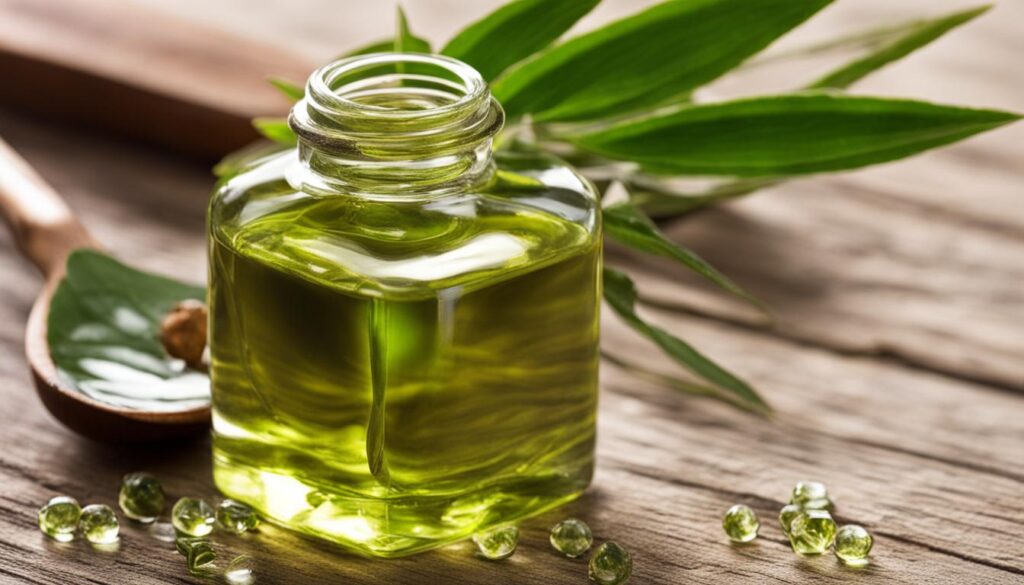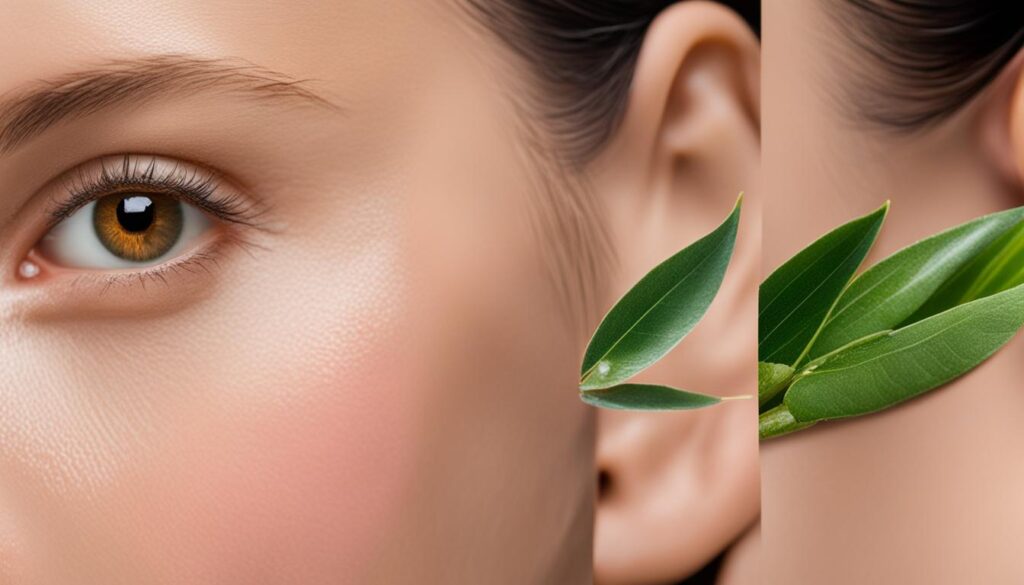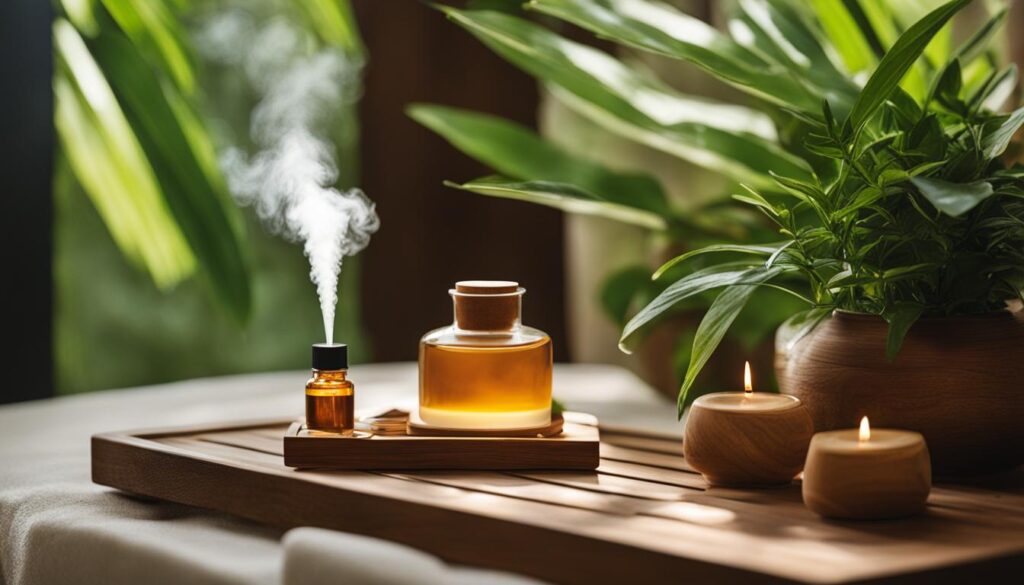Tea tree oil is a versatile essential oil that offers numerous benefits for both skin and hair care. With its natural antiseptic and anti-inflammatory properties, tea tree oil is a valuable addition to your daily beauty routine. It has been used for centuries in traditional medicine and is now widely recognized for its therapeutic effects.
When it comes to skin care, tea tree oil can moisturize dry skin, balance oily skin, and even reduce acne-causing bacteria. It can also help with nail fungus and provide relief for various skin conditions. For hair care, tea tree oil promotes hair growth, improves scalp health, and fights dandruff.
Whether you are struggling with skin issues, hair problems, or simply looking for a natural ingredient to enhance your beauty routine, tea tree oil can be the solution you’ve been searching for. Its healing and disinfecting properties make it a valuable ingredient in holistic and natural personal care products.
Key Takeaways:
- Tea tree oil offers numerous benefits for both skin and hair care.
- It has natural antiseptic and anti-inflammatory properties.
- Tea tree oil moisturizes dry skin, balances oily skin, and reduces acne-causing bacteria.
- It promotes hair growth, improves scalp health, and fights dandruff.
- Tea tree oil can be found in various personal care products.
Tea Tree Oil for Hair: The Secret to Happy Locks

Tea tree oil is a powerful natural ingredient that offers a multitude of benefits for hair care. Its unique properties help promote healthy hair growth, improve scalp health, and combat common hair problems. Incorporating tea tree oil into your hair care routine can be the secret to achieving happy and luscious locks.
Promotes Hair Growth
One of the key benefits of tea tree oil for hair is its ability to unclog hair follicles and nourish the roots, stimulating hair growth. By improving blood circulation in the scalp, tea tree oil helps deliver essential nutrients to the hair follicles, promoting longer and thicker hair.
Moisturizes and Reduces Dryness
Dry scalp and hair can lead to itchiness and flaking. Tea tree oil acts as a natural moisturizer, hydrating the scalp and hair strands. It helps reduce dryness and flaking, making it an effective remedy for dandruff and dry scalp conditions.
Improves Scalp Health
A healthy scalp is essential for healthy hair. Tea tree oil has natural antiseptic and antimicrobial properties that can fight off bacteria and fungi, improving overall scalp health. It helps minimize scalp inflammation, soothes itchiness, and reduces the occurrence of scalp conditions.
Combats Head Lice
Head lice can be a common problem, especially among children. Tea tree oil has insecticidal properties that can effectively fight off head lice. When mixed with a carrier oil, such as coconut oil, tea tree oil can be used as a natural and non-toxic treatment to remove head lice and their eggs.
Usage and Application
Tea tree oil can be incorporated into your hair care routine in various ways. It can be added to your favorite shampoo or conditioner, or you can create a homemade hair mask by mixing tea tree oil with a carrier oil, such as almond or jojoba oil. Massage the oil mixture into your scalp and hair, allowing it to penetrate for a few minutes before rinsing thoroughly.
Precautions
“When using tea tree oil for hair, it is important to remember that it is highly concentrated. It should always be diluted with a carrier oil before applying it directly to the scalp. Conduct a patch test before using tea tree oil to ensure that you are not allergic or sensitive to it. If any irritation occurs, discontinue use immediately. Pregnant women and individuals with sensitive skin should consult with a healthcare professional before using tea tree oil.”
| Benefits of Tea Tree Oil for Hair | How to Use Tea Tree Oil for Hair |
|---|---|
| Promotes hair growth | Add a few drops of tea tree oil to your shampoo or conditioner |
| Moisturizes and reduces dryness | Create a hair mask by mixing tea tree oil with a carrier oil and leave it on for 20 minutes before rinsing |
| Improves scalp health | Add a few drops of tea tree oil to coconut oil and massage it into the scalp |
| Combats head lice | Mix tea tree oil with olive oil and apply it to the scalp, using a fine-tooth comb to remove lice |
Tea Tree Oil for Skin: Enhancing Your Complexion

Tea tree oil is a powerhouse ingredient when it comes to skin care, offering a multitude of benefits to enhance your complexion. With its potent antibacterial properties, tea tree oil helps combat acne-causing bacteria, making it an effective treatment for acne and preventing breakouts. It also works wonders in reducing inflammation and redness associated with acne, leaving your skin smooth and clear.
In addition to tackling acne, tea tree oil has incredible healing properties that can help fade dark spots and hyperpigmentation. Whether it’s acne scars or sunspots, tea tree oil can contribute to a more even and radiant complexion. Its natural moisturizing abilities make it suitable for addressing dry skin as well, providing soothing relief. If you have oily skin, tea tree oil can help balance sebum production and control excess oil.
Using tea tree oil for skin care is easy and versatile. It can be applied directly to the skin after diluting it with a carrier oil, such as coconut oil or olive oil, to prevent any potential irritation. Alternatively, you can incorporate tea tree oil into your existing skincare products, such as cleansers, toners, and moisturizers, to enhance their effectiveness.
Tea Tree Oil for Acne: Banishing Breakouts
Tea tree oil’s antibacterial properties make it a powerful weapon against acne. Its ability to kill acne-causing bacteria helps clear up existing breakouts and prevent new ones from forming. Regular use of tea tree oil can significantly improve the appearance of acne-prone skin, leaving it blemish-free and smooth.
Tea Tree Oil for Dark Spots: Fading Hyperpigmentation
If you’re dealing with dark spots or hyperpigmentation, tea tree oil can come to your rescue. Its healing properties help reduce the appearance of pigmented areas, leaving your skin more even-toned and rejuvenated.
Tea Tree Oil for Inflammation: Soothing and Calming
Inflammation is a common skin concern, and tea tree oil can be an effective remedy for reducing redness and inflammation. Its anti-inflammatory properties help calm irritated skin and promote a healthier, more balanced complexion.
| Benefits | How to Use |
|---|---|
| Reduces acne | Apply diluted tea tree oil directly to the affected areas or add it to skincare products |
| Fades dark spots and hyperpigmentation | Massage diluted tea tree oil onto the pigmented areas twice daily |
| Soothes inflammation | Apply diluted tea tree oil to the inflamed skin or mix it with a carrier oil for a calming facial massage |
Tea Tree Oil for Scalp Health: Say Goodbye to Itchy Scalp

When it comes to scalp issues like dandruff and itchiness, tea tree oil is a popular and effective remedy. Its antifungal and antibacterial properties make it a powerful weapon against the yeast that causes dandruff. By reducing flaking and relieving itchiness, tea tree oil helps create a healthier scalp environment.
Regular use of tea tree oil can lead to improved overall scalp health and even promote hair growth. Whether added to your favorite shampoos and conditioners or used in DIY hair masks, tea tree oil nourishes and treats the scalp.
One of the telltale signs that tea tree oil is working on your scalp is the tingling sensation it produces. This tingling indicates the oil is actively addressing any scalp issues and stimulating the scalp for optimal results.
So say goodbye to the discomfort of an itchy scalp and embrace the soothing power of tea tree oil for scalp health and hair growth.
| Benefits of Tea Tree Oil for Scalp | How to Use Tea Tree Oil for Scalp Health |
|---|---|
| Reduces dandruff | 1. Add a few drops of tea tree oil to your shampoo and mix well. 2. Use the mixture to wash your hair, focusing on the scalp area. 3. Rinse thoroughly. |
| Relieves itching | 1. Dilute tea tree oil with a carrier oil like coconut oil. 2. Massage the mixture into your scalp. 3. Leave it on for 15-30 minutes before washing off. |
| Promotes scalp health | 1. Create a hair mask by combining tea tree oil with a carrier oil like jojoba oil and aloe vera gel. 2. Apply the mask to your scalp and hair. 3. Leave it on for 30 minutes to an hour before rinsing. |
| Stimulates hair growth | 1. Mix a few drops of tea tree oil with coconut oil. 2. Gently massage the mixture onto your scalp for a few minutes. 3. Leave it on overnight and wash your hair the next morning. |
Tea Tree Oil for Nail Care: Healthy Nails, Happy Hands

When it comes to nail care, tea tree oil is a natural remedy that can work wonders. Its antifungal properties make it particularly effective in treating nail fungus, ensuring that your nails stay healthy and strong. By applying tea tree oil directly to the affected nails, you can clear the infection and promote optimal nail growth.
But tea tree oil isn’t just for combating nail fungus. It’s also beneficial for maintaining overall nail health. By moisturizing and nourishing your nails and cuticles, tea tree oil helps prevent dryness and keeps your nails in top condition. It can even help soften cuticles, making it easier to maintain their cleanliness and appearance.
Regular use of tea tree oil for nail care is key to reaping its benefits. By incorporating this natural remedy into your routine, you can have healthy nails and happy hands.
Bring out the full potential of your nails with the power of tea tree oil.
Tea Tree Oil for Nail Care: Key Benefits
| Benefits | Description |
|---|---|
| Eliminates nail fungus | Tea tree oil’s antifungal properties help clear nail infections and promote healthy nail growth. |
| Moisturizes and nourishes nails | By applying tea tree oil, your nails and cuticles can be hydrated and prevented from becoming dry. |
| Softens cuticles | Tea tree oil can help soften cuticles, making it easier to maintain their cleanliness and appearance. |
Experience the benefits of tea tree oil for nail care and enjoy beautiful, healthy nails. Incorporate this natural remedy into your daily routine to maintain optimal nail health and promote stronger, more resilient nails.
Tea Tree Oil for Antifungal Benefits: Powerful Defense against Infections

When it comes to fighting infections, tea tree oil proves to be a valuable asset, thanks to its potent antifungal properties. This versatile essential oil is effective in treating various skin infections caused by fungi, bacteria, or viruses.
Tea tree oil can be applied topically to eliminate the microbes responsible for the infection and prevent further spread. Its antifungal benefits make it a go-to solution for conditions such as athlete’s foot, ringworm, and nail fungus.
One of the advantages of using tea tree oil is its natural composition, which allows for safe and chemical-free treatment options. Whether used alone or in combination with other natural remedies, tea tree oil offers a powerful defense against fungal infections.
Tea Tree Oil for Aromatherapy: Relax and Rejuvenate

When it comes to aromatherapy, tea tree oil is a top choice for relaxation and stress relief. Its invigorating and uplifting properties can help calm the mind and body, creating a harmonious atmosphere to unwind and rejuvenate.
One of the best ways to incorporate tea tree oil into your aromatherapy routine is by using a diffuser. Add a few drops of tea tree oil to your diffuser, and let the gentle aroma fill the room. As the fragrance diffuses, it can help create a soothing environment, reducing stress and promoting a sense of calm.
In addition to diffusing, tea tree oil can also be added to bathwater for a luxurious and relaxing experience. Simply add a few drops of tea tree oil to your bath, allowing the warm water to release its aromatic properties. As you soak, the scent of tea tree oil can help alleviate stress and promote relaxation.
Furthermore, the therapeutic properties of tea tree oil can benefit respiratory health. Its aroma has a refreshing and clearing effect on the airways, making it a valuable ally for those experiencing congestion or respiratory issues. Inhaling the scent of tea tree oil can help open up the air passages and provide relief.
When using tea tree oil for aromatherapy, it’s important to remember that a little goes a long way. Start with a small amount and adjust as needed to find the right balance of fragrance. Keep in mind that tea tree oil is potent, so a few drops are generally sufficient.
In summary, tea tree oil is an excellent choice for aromatherapy, offering relaxation, stress relief, and respiratory benefits. Whether through a diffuser or a soothing bath, incorporating tea tree oil into your aromatherapy routine can enhance your overall well-being and promote a sense of tranquility.
Tea Tree Oil as a Natural Disinfectant: Keeping Your Environment Clean

When it comes to maintaining a clean and healthy environment, tea tree oil is a powerful tool. With its natural antimicrobial properties, tea tree oil can effectively disinfect surfaces and eliminate harmful bacteria and viruses.
To use tea tree oil as a surface cleaner, simply mix a few drops of the oil with water or vinegar. This creates an all-purpose cleaner that is safe, chemical-free, and effective at killing germs. Whether it’s countertops, bathroom fixtures, or kitchen appliances, tea tree oil can leave your surfaces clean and sanitized.
Additionally, tea tree oil can also be used as a hand sanitizer. Its germ-killing benefits make it an excellent alternative to commercial sanitizers that may contain harsh chemicals. Simply dilute tea tree oil with a carrier oil, such as coconut oil, and apply it to your hands for natural and effective disinfection.
For those who prefer homemade cleaning products, adding a few drops of tea tree oil can enhance their disinfecting properties. Whether it’s a homemade floor cleaner or a DIY bathroom spray, tea tree oil can provide an extra layer of cleanliness and freshness.
By incorporating tea tree oil into your cleaning routine, you can maintain a clean and healthy environment without relying on harsh chemicals. This natural disinfectant offers a safer and more eco-friendly way to keep your surroundings free from harmful microbes.
Keep in mind: Always perform a patch test before using tea tree oil on surfaces. Some materials may be sensitive to the oil, so it’s important to test for any adverse reactions.
Safety Precautions when Using Tea Tree Oil: Proceed with Caution
While tea tree oil offers numerous benefits, it is crucial to prioritize safety and responsible usage. Tea tree oil is intended for external use only and should never be ingested. To ensure optimal results, always dilute tea tree oil with a carrier oil such as coconut oil or olive oil before applying it to the skin.
Care should be taken when using tea tree oil in the delicate eye area to avoid irritation. It is highly recommended to perform a patch test before applying tea tree oil on a larger area of the skin. This simple test can help identify any adverse reactions and determine the suitability of tea tree oil for individual skin types.
Pregnant women and individuals with hormone-sensitive conditions should exercise caution when using tea tree oil. It is advisable to consult with a healthcare professional before incorporating tea tree oil into their routines to ensure its compatibility with their specific circumstances.
By following these safety precautions and using tea tree oil responsibly, you can enjoy its many benefits for skin and hair care while prioritizing your well-being and avoiding potential risks.
Tea Tree Oil Products: Incorporating the Benefits into Your Routine
Tea tree oil is a popular ingredient known for its numerous benefits in personal care products. By incorporating tea tree oil products into your routine, you can experience the advantages of this versatile essential oil. From tea tree oil shampoos and conditioners to body washes and skincare products, there are various options available to harness the power of tea tree oil and enhance your beauty and self-care regimen.
Tea Tree Oil Shampoo and Conditioner
Tea tree oil shampoos and conditioners provide the benefits of tea tree oil specifically for hair and scalp health. They can help unclog hair follicles, promote hair growth, and moisturize the scalp. Tea tree oil shampoos are effective in combating dandruff, reducing dryness, and soothing an itchy scalp, while conditioners help nourish and strengthen the hair.
Tea Tree Oil Body Wash
A tea tree oil body wash can be a refreshing addition to your shower routine. It cleanses and nourishes the skin, leaving it feeling clean and rejuvenated. The natural properties of tea tree oil help combat bacteria and fungi, making it an excellent choice for maintaining overall skin health.
Tea Tree Oil Skincare Products
Skincare products such as cleansers, moisturizers, and spot treatments that contain tea tree oil offer targeted benefits for clear and healthy skin. Tea tree oil’s antibacterial and anti-inflammatory properties make it effective in managing acne, reducing inflammation, and controlling oiliness. These skincare products can be used as part of your daily routine to help maintain a balanced complexion.
By incorporating tea tree oil products into your beauty and self-care routine, you can enjoy the benefits of this versatile essential oil. From promoting hair and scalp health to nourishing the skin, tea tree oil offers a natural and holistic approach to personal care.
Conclusion
Tea tree oil, with its numerous benefits for skin and hair care, is a truly versatile essential oil that should be incorporated into your daily beauty routine. By leveraging its natural antiseptic and anti-inflammatory properties, tea tree oil helps promote hair growth, improve scalp health, and address a range of skin concerns. Whether you’re struggling with acne, dry skin, or fungal infections, tea tree oil can provide the holistic and natural care you need.
However, it is crucial to prioritize safety when using tea tree oil. Dilute it properly with a carrier oil and avoid ingesting it. Perform a patch test before applying it to larger areas of your skin, and be cautious around the delicate eye area. Pregnant women and individuals with hormone-sensitive conditions should refrain from using tea tree oil.
By embracing the benefits of tea tree oil and incorporating it into your beauty and self-care routine, you can optimize your skin and hair health while enjoying the wonders of natural care. Remember to follow the right dilution and usage guidelines, and you’ll be well on your way to reaping the rewards of this remarkable essential oil.
FAQ
What are the benefits of tea tree oil for skin and hair care?
Tea tree oil offers numerous benefits for both skin and hair care, such as promoting hair growth, improving scalp health, reducing acne-causing bacteria, moisturizing dry skin, balancing oily skin, and even helping with nail fungus.
How can tea tree oil be used for hair?
Tea tree oil can be added to shampoos and conditioners, used as a hair mask, or massaged into the scalp to unclog hair follicles, nourish the roots, promote hair growth, moisturize the scalp, and reduce dandruff and itchiness.
What are the benefits of tea tree oil for the skin?
Tea tree oil can reduce acne-causing bacteria, inflammation, redness, and dark spots. It moisturizes dry skin, balances oily skin, and can be used as a natural moisturizer to soothe the skin.
How can tea tree oil be used for scalp health?
Tea tree oil can be added to shampoos and conditioners or used in hair masks to treat dandruff, itchiness, and promote overall scalp health and hair growth.
What are the benefits of tea tree oil for nail care?
Tea tree oil has antifungal properties that can help clear nail fungus and promote healthy nail growth. It can also moisturize and nourish the nails and cuticles, preventing dryness.
How can tea tree oil help with fungal infections?
Tea tree oil has potent antifungal properties that can treat various skin infections caused by fungi, bacteria, or viruses, such as athlete’s foot, ringworm, and nail fungus.
How can tea tree oil be used in aromatherapy?
Tea tree oil can be used in diffusers or added to bathwater to promote relaxation, reduce stress, and improve respiratory health.
How can tea tree oil be used as a natural disinfectant?
Tea tree oil can be mixed with water or vinegar to create an effective all-purpose cleaner or used as a hand sanitizer, providing germ-killing benefits without harsh chemicals.
What safety precautions should be taken when using tea tree oil?
Tea tree oil is meant for external use only and should be diluted with a carrier oil before applying to the skin. A patch test should be performed, and it should be kept away from the eye area. Pregnant women and individuals with hormone-sensitive conditions should avoid using tea tree oil.
What tea tree oil products are available?
There are tea tree oil shampoos, conditioners, body washes, cleansers, moisturizers, and spot treatments available that incorporate the benefits of tea tree oil for hair, skin, and nail care.






